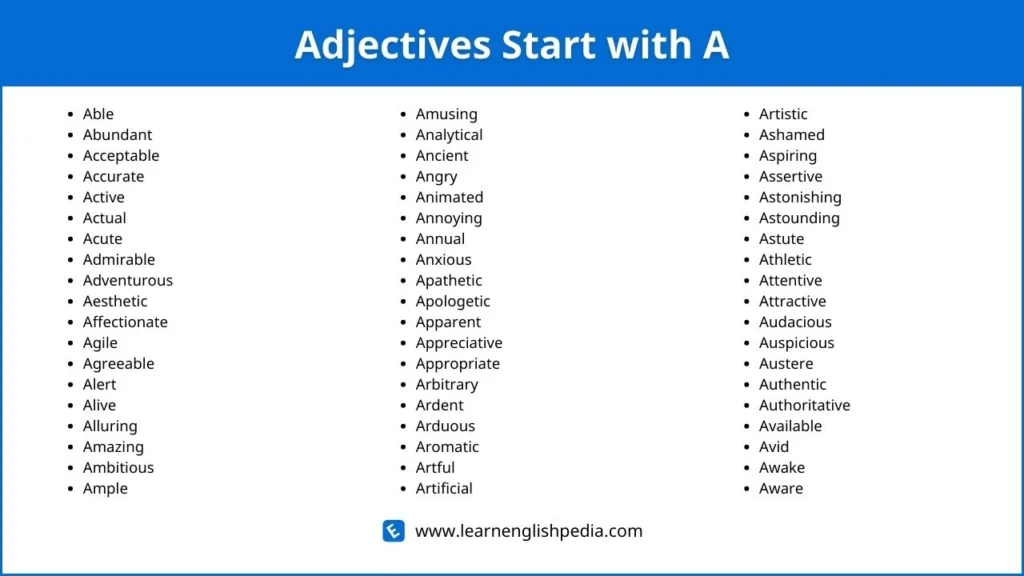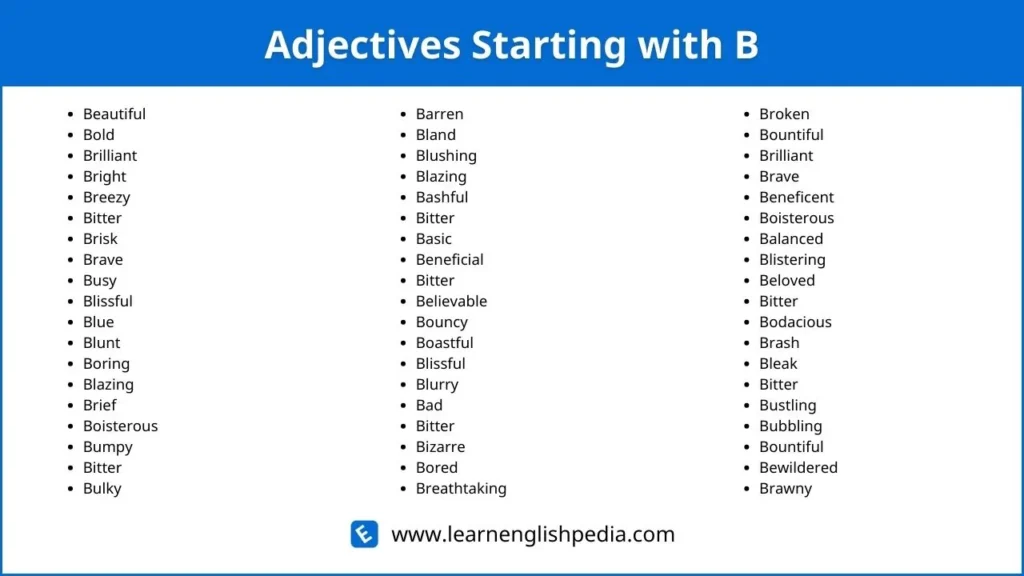इस article में हम Adjectives in hindi के बारे में जानेंगे। हम जानेंगे कि Adjectives क्या है, कितने प्रकार की होते है और उनके उदाहरण क्या क्या है? साथ ही हम यह भी जानेंगे कि adjectives का प्रयोग कहाँ कहाँ किया जाता है?
Adjectives in Hindi
An adjective is a word that adds something to the meaning of a noun or pronoun.
Noun या pronoun की विशेषता बताने वाले शब्दों को adjectives कहते हैं, जैसे –
| (a) Ram has a black pen. | राम के पास एक काला पेन है। |
| (b) The dog is white. | कुत्ता सफेद है। |
| (c) It was a poor attempt. | यह एक घटिया प्रयास था। |
| (d) He has enough money. | उसके पास पर्याप्त धन है। |
| (e) These photographs are yours. | उसके पास पर्याप्त धन है। |
| (f) Jind is a small town. | जींद एक छोटा शहर है। |
| (g) He did not eat any bread. | उसने कोई रोटी नहीं खाई। |
उपरोक्त वाक्यों में black, white, poor, enough, these, small और any शब्दों से noun के गुण दोष और रंग आदि का बोध होता है, इसलिए यह सब adjectives है।
Kinds of Adjectives
1. Adjective of Quality (गुणवाचक विशेषण)
2. Adjective of quantity (परिणाम वाचक/मात्रा वाचक विशेषण)
3. Adjective of number (संख्यावाचक विशेषण)
4. Demonstrative Adjectives (संकेतवाचक या निर्देशक विशेषण)
5. Distributive Adjectives (प्रत्येक सूचक विशेषण)
6. Interrogative Adjectives (प्रश्नवाचक विशेषण)
7. Possessive Adjectives (संबंधवाचक विशेषण)
1. Adjective of Quality
It shows the kind of a person, an animal, a place or a thing.
ये व्यक्ति किसी व्यक्ति, वस्तु या स्थान के गुणों या अवगुणो का बोध कराते है। इसके कुछ उदाहरण इस प्रकार है – bad, beautiful, circular, clever, dry, golden, good, great, handsome, heavy, intelligent, kind, long, lovely, ripe, sharp, short, small, square, tall, etc.
| (a) These are ripe mangoes. | ये पके आम हैं। |
| (b) He is a handsome man. | वह एक सुंदर आदमी है। |
| (c) This circular road will lead to the bus stand. | यह वृत्ताकार सड़क बस स्टैंड की ओर ले जाएगी। |
| (d) The pilgrims met many kind persons on the way. | तीर्थयात्री रास्ते में कई तरह के व्यक्तियों से मिले। |
| (e) The beautiful landscapes of hilly regions attract tourists. | पहाड़ी क्षेत्रों के सुंदर परिदृश्य पर्यटकों को आकर्षित करते हैं। |
| (f) Ram is my best friend. | राम मेरे अच्छा मित्र हैं। |
उपरोक्त sentences में ripe, handsome, circular, kind, beautiful और best – adjectives of qualities है। यह ‘adjectives of what kind?’ का उत्तर देते हैं।
2. Adjectives of Quantity
It shows how much of a thing is meant.
ये adjectives वस्तुओं के परिमाण और माप बताते है। निचे कुछ adjectives of quantity के उदाहरण है – a great deal of, a lot of, any, enough, few, little, lots of, many, much, one, plenty of, some, twenty, whole, all, etc.
| (a) All the money we had is spent. | हमारे पास जो भी पैसा था, वह सब खर्च हो गया। |
| (b) There is little milk in the jug. | गुड़ में थोड़ा दूध होता है। |
| (c) I have some money. | मेरे पास कुछ पैसे हैं। |
| (d) She ate the whole loaf. | उसने पूरी रोटी खा ली। |
| (e) They have much work to do. | उनके पास करने के लिए बहुत काम है। |
उपरोक्त sentences में all, little, some, whole और much – adjectives of quantity है, ये adjectives ‘How much?’ का उत्तर देते है।
3. Adjectives of Number or Numeral Adjectives
These show how many persons or things are meant, or in what order a person or thing stands.
ये adjectives व्यक्ति या वस्तुओ की संख्या या क्रम बताते है। इस प्रकार के adjectives के दो प्रकार होते है जिनके बारे में नीचे बताया गया है।
A. Definite Number Adjectives – इससे व्यक्ति तथा वास्तु की निश्चित संख्या का ज्ञात होता है। इसके तीन प्रकार होते है –
(i) Cardinal Numeral adjectives – one, two, three, four, etc. जैसे –
| (a) Five men were swimming in the river. | नदी में पांच आदमी तैर रहे थे। |
| (b) Two airplanes carried few passengers. | दो हवाई जहाज कुछ यात्रियों को ले गए। |
| (c) There are seven days in a week. | कमजोर में सात दिन होते हैं। |
| (d) They have four children. | उनके चार बच्चे हैं। |
उपरोक्त sentences में five, two, seven और four – cardinal numeral adjectives के उदाहरण है।
(ii) Ordinal Numeral Adjectives – First, second third और fourth etc. इनके आगे the का प्रयोग होता है और इसके बाद singular noun लगती है, जैसे –
| (a) The first man in the second row is my brother. | दूसरी पंक्ति का पहला आदमी मेरा भाई है। |
| (b) March is the third month of the year. | मार्च वर्ष का तीसरा महीना है। |
उपरोक्त sentences में first, second और third – ordinal numeral adjectives के उदाहरण है।
(iii) Multiplicative adjectives – Single, double, triple, etc.
ध्यान रखें।
निम्नलिखित definite numerals के बाद ‘of’ का प्रयोग नहीं होता, noun का प्रयोग होता है, जैसे – a dozen, a hundred, a thousand, a million.
| (a) We have a dozen pens. | हमारे पास एक दर्जन पेन हैं। |
| (b) He has a hundred cows. | उसके पास सौ गायें हैं। |
उपरोक्त sentences में dozens और hundred adjectives of numbers है।
यदि definite numerals के पहले ‘a’ नहीं हो, तो उनसे अनिश्चित संख्या का बोध होता है, ऐसी स्थिति में ‘of’ का प्रयोग अवश्य होता है, जैसे – a lakh of men, a pair of shoes, a couple of hours
| (a) We have dozens of pens. | हमारे पास दर्जनों पेन हैं। |
| (b) He has hundreds of cows. | उसके पास सैकड़ों गायें हैं। |
उपरोक्त sentences में dozens और hundred adjectives of numbers है।
B. Indefinite Numbers Adjectives – इससे अनिश्चित संख्या का बोध होता है, जैसे – a good many, a great, a great deal of, a lot of, enough, lots of, many, many a, numerous, plenty of, several, some, various, etc.
| (a) Some boys are playing. | कुछ लड़के खेल रहे हैं। |
| (b) I have many friends. | मेरे कई दोस्त हैं। |
| (c) Some men are rich. | कुछ पुरुष अमीर हैं। |
| (d) Many boys came to the meeting. | बैठक में कई लड़के आए। |
| (e) There are several errors in your story. | आपकी कहानी में कई गलतियां हैं। |
उपरोक्त sentences में some, many और several – Indefinite numbers adjectives है। ये adjectives ‘how many?’ का उत्तर देते है।
Also Read – Parts of Speech in Hindi
4. Demonstrative Adjectives
These point out which persons, places, or things are meant.
ये adjectives व्यक्ति, स्थान और वस्तुओं की संकेत करते है। ये दो प्रकार के होते है –
(i) Definite Demonstrative Adjectives
जैसे – such, that, the other, the same, these, this, those, etc.
| (a) That boy is my friend. | वह लड़का मेरा दोस्त है। |
| (b) Those stories are quite interesting. | वे कहानियाँ काफी रोचक हैं। |
| (c) These questions are out of the syllabus. | ये प्रश्न पाठ्यक्रम से बाहर हैं। |
| (d) Give me this pen. | मुझे यह कलम दो। |
(ii) Indefinite Demonstrative Adjectives
जैसे – a, a certain, an, another, any, certain, other, some, that, this, etc.
इनके बाअद हमेशा singular countable noun आती है, जैसे a certain boy न कि a certain boys
5. Distributive Adjectives
These show that persons or things are taken singly or separately.
जो adjectives किसी वर्ग की प्रत्येक व्यक्ति या वस्तु को प्रकट करे, distributive adjectives कहलाते है। ये distribution को प्रकट करते है, जैसे –
| (a) Each beggar was given alms. | प्रत्येक भिखारी को भिक्षा दी गई। |
| (b) Each girl will make a speech. | प्रत्येक लड़की भाषण देगी। |
| (c) There are trees on either side. | दोनों ओर पेड़ हैं। |
| (d) Neither answer is right. | कोई उत्तर सही नहीं है। |
उपरोक्त sentences में each, either और neither – demonstrative adjectives है।
6. Interrogative Adjectives
These adjectives are used with nouns to ask questions.
ये adjectives, noun के साथ लगकर प्रश्न पूछने का कार्य करते है, जैसे –
| (a) Which book is yours? | आपकी कौन सी पुस्तक है? |
| (b) Which road should we take to reach the railway station? | रेलवे स्टेशन तक पहुँचने के लिए हमें कौन सी सड़क लेनी चाहिए? |
| (c) Which way will you go? | आप किस रास्ते पर जाएंगे? |
| (d) Whose phone is this? | यह किसका फोन है? |
उपरोक्त sentences में which और whose – interrogative adjectives है।
7. Possessive Adjectives
The adjectives which show possession or relationship are called possessive adjectives.
ये adjectives स्वामित्व (ownership) या संबंध (relationship) प्रकट करते है। जैसे – my, our, your, his, her, their, its.
| (a) Our dog has bitten their rabbit. | हमारे कुत्ते ने अपने खरगोश को काट लिया है। |
| (b) That is their school. | यह उनका स्कूल है। |
| (c) Her purse was lost. | उसका पर्स खो गया था। |
| (d) The rose has its own fragrance. | गुलाब की अपनी खुशबू है। |
| (e) My village is not backward. | मेरा गाँव पिछड़ा नहीं है। |
उपरोक्त sentences में our, that, her और my – possessive adjectives है। ये adjectives ‘whose?’ का उत्तर देते है।
Note – His का प्रयोग possessive pronouns और possessive adjectives दोनों के रूप होता है, जैसे –
| (a) This is his book. (Possessive adjective) | यह उनकी पुस्तक है। (संबंधवाचक विशेषण) |
| (b) This book is his. (Possessive pronoun) | यह पुस्तक उनकी है। (संबंधवाचक सर्वनाम) |
Possessives adjectives का प्रयोग noun के पहले तथा possessive pronouns का प्रयोग verb के बाद होता है, जैसे –
| (a) This is my book. (Possessive adjective) | यह मेरी पुस्तक है। (संबंधवाचक विशेषण) |
| (b) This book is mine (Possessive pronoun) | यह पुस्तक मेरी है (संबंधवाचक सर्वनाम) |


